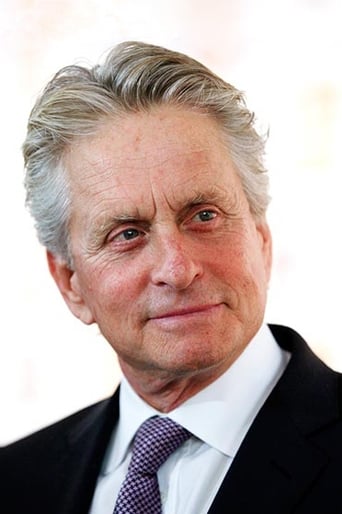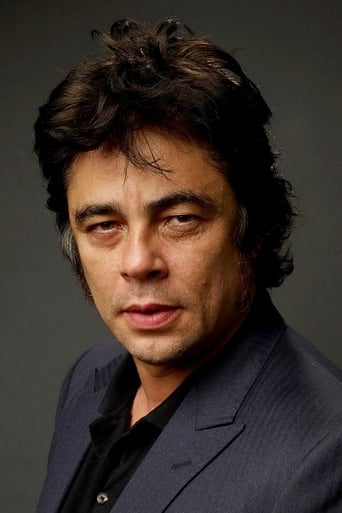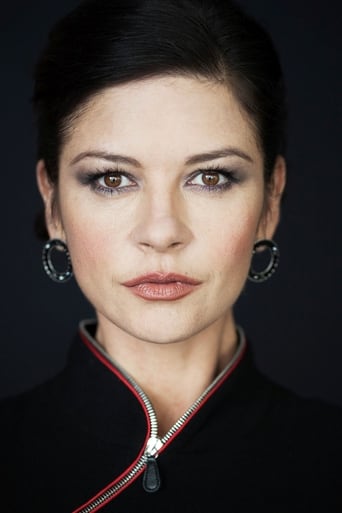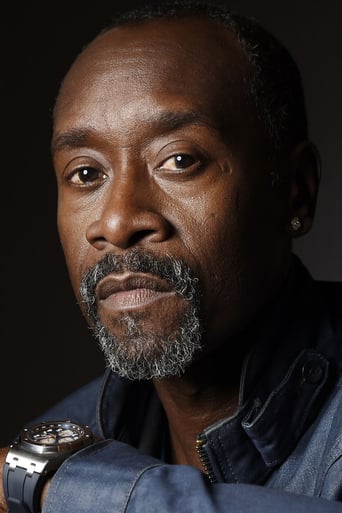Fluentiama
Perfect cast and a good story
FuzzyTagz
If the ambition is to provide two hours of instantly forgettable, popcorn-munching escapism, it succeeds.
Humbersi
The first must-see film of the year.
Lela
The tone of this movie is interesting -- the stakes are both dramatic and high, but it's balanced with a lot of fun, tongue and cheek dialogue.
fdalmolin
I personally think that Traffic has aged really well. Firstly, that's because of the intricate and still modern plot that involves a lot of deep characters very well portrayed. Most of all, the performances of Benicio Del Toro (as Javier Rodriguez Rodriguez), Michael Douglas (as Robert Wakefield) and the debuting Erika Christensen (as Robert's daughter) were absolutely stunning. Douglas stands out with the character of the new head of DEA Wakefield who at the end resignes from his post because of several reasons. For example, his daughter ends up in an addiction from cocaine and he decides to stand by her side. He also thinks that the war against drugs can't be won, because it's an endless cycle and when you think that you finally defeated it, it is actually just getting worse.
Finally, I also appreciated the experiments with filters (blue, yellow and neutral) and light. Even if in some cases I found them a little bit too exaggerated, I think that they add drama to the story and that they help the audience distinguish the three main stories.
mattjseed
When watching traffic it evokes memories of more recent and more popular shows like narcos. You get a similar setting and overall feel to it. However traffic is different in that it was made just after the events it depicts took place. This puts it in an interesting place for movies. Because it is set in the time it was filmed and is meant to be that time and makes this clear you are almost taking back in time 18 years. On top of this the movie doesn't use any effects that have aged badly or look inferior now. So over all I would say the movie has aged well and is still very much watchable.
Michael Douglas' character could be argued to be the main character so it is important to look at how his arc ended. Specifically his resignation. This was for a few main reasons the main of which being his daughter. He also could not look the American people in the eyes and tell them that their own families are the enemy. I would also attribute the betrayal of general Salazar as a factor as well. This showed him how corrupt everything was and how the only person he thought was helping in Mexico really wasn't.
The last important thing to talk about is the elephant in the room of the tone and colour shifts from scene to scene depending on the location. Although a cool concept I don't think it adds to the story and I just see it as a gimmick.
HotToastyRag
Even though Traffic has an all-star cast, the famously raw direction of Steven Soderbergh, and won four Academy Awards, I can't in good conscience recommend that you watch this movie. It's incredibly disturbing, and the main message of the film can be understood without having to sit through two and half hours of upsetting material: Drugs are bad, damaging, and prevalent. There you have it! Save yourself, memorize that message, and just pretend you've seen Traffic when anyone asks you.Traffic is about drug trafficking, and it shows the journey of drugs coming up across the border from Mexico, how they're transferred from drug dealers to drug users, and eventually how they end up in the hands of our most vulnerable: children. In the Mexican scenes, Benicio Del Toro-who won Best Supporting Actor-Jacob Vargas, and Tomas Milian star. When the DEA agents are trying to arrest American drug lords, Don Cheadle, Luis Guzman, Miguel Ferrer, Catherine Zeta-Jones, Dennis Quaid, Steven Bauer, and Benjamin Bratt star. And in the scenes that tragically show bored teenagers developing drug addictions, Michael Douglas, James Brolin, Albert Finney, Amy Irving, Erika Christensen, and Topher Grace star.You can see why it's tempting to watch this film, since so many actors and actresses were recruited to take part, but unless you really enjoy watching gritty, upsetting movies that show the filthy underbelly of the country, you will be seriously scarred by watching it. If you are a parent, whether or not your child has developed a substance abuse problem or is as innocent as an angel, you will find this film extremely difficult to watch. Michael Douglas gives a wonderful performance, one that every parent and husband in the audience will identify with. Ironically, while there was quite a bit of hype of the real-life husband and wife pair starring in the same film, Michael and Catherine aren't in any scenes together, since they're separated by different storylines.I can't stop you from watching Traffic, but I can caution you as much as I can. The only reason I watched it was because I'd been cast as the lead role in the play Addict, whose title is probably self-explanatory. At the time, I had so little knowledge of drugs, I didn't even understand the lines my character was scripted to deliver. My brother insisted I watch Traffic with him as homework for the play. Given my druthers, I never would have watched it, and I sincerely wish I'd never been forced to sit through it in the first place.
ElMaruecan82
As far as drugs are concerned, every wheel of the machinery gets a shot (no pun intended) users, enforcers, wholesalers, politicians and of course, traffickers, the whole trade has no secrets for you when you finish Steven Soderbergh's Best Picture nominee "Traffic", a Harvard-like school case proving that every business has a specific functioning, and drugs, let's not kid ourselves, is a business.Two comments before getting back to the film; Soderbergh had the privilege of being one of the few directors with two Best Picture nominees the same year, but I wasn't impressed by "Erin Brockovich" where Julia Roberts played the underdog crusader in the exact cinematic way that could have ruined "Traffic". Secondly, the film was made the same year than another anti-drug movie: "Requiem For a Dream", the two movies complete each other very well, and would have made a better pair of co-nominees; parenthesis closed."Traffic" uses a narrative structure popularized by Robert Altman with "Nashville" (and later "Short Cuts") and Fellini with his "Amarcord", the term was coined as "'Hyperlink Cinema" and it defined movies made of different interlocking stories, with no apparent connection, until they all finally converge toward a final realization of informational or existential value. This storytelling method has been popularized by Tarantino and Paul Thomas Anderson but "Traffic" is less a "Magnolia" meets "Requiem for a Dream" than the true consecration of a form of storytelling, paving the way to many socially-loaded documentary-like dramas like "City of God", "Syriana", "Crash" and "Babel"."Traffic" is a product of a new time where Internet had emphasized our capacity to process brief, impacting and flashy information at the same time, sometimes at the expense of understanding but most commonly, for the sake of objectivity as today's audiences are less inclined to believe anything shown from one perspective and even in the case of drugs, we need the big picture. And what "Traffic" does is reconciling a new positive mindset with big-scope storytelling, showing how the titular word is handled by Mexican law enforcers, one of them is Rodriguez, played by Benicio Del Toro in his Oscar-winning role, and American cops played by Don Cheadle and Luis Guzman.Many things happen that don't seem to have a connection, but we suspect they are many pieces of jigsaw puzzle. Halfway through the film, we learn that General Salazar (Terri Millian) is fighting the Tijuana cartel lead by the Obregon brothers and get them through the testimony of a local hit man. The Miguel Ferrer character, previously arrested by the American cop, accepts, in exchange for immunity, to give his boss, a civilized 'Tony Montana' played by his sidekick (Steven Bauer). The life of his socialite wife (Catherine Zeta Jones) all falls apart and she receives threats against her son and must find a solution to live up to her imprisoned husband's contract, going against the usual trend of drugs movies that reflect the way it affects impoverished lives, driving people into the corners of dealing and prostitution (and "Traffic" is no exception).Speaking of the rich, the core of the story is Michael Douglas as Robert Wakefield, appointed as a head the President's Office of National Drug Control Policy against drugs, ignoring that his daughter, a honor student played by Erika Christensen is a drug addict. This story-line is the actual link with "Requiem for a Dream" and it's essential to have the health effect, but not for the reasons that you'd think. Indeed, if the film was a mere denunciation, it would have fallen in the preachy trap. "Traffic" doesn't much denounce drugs than the uselessness of a crusade that actually harms more than it solves, the film pinpoints some aspects that can easily get overlooked in movies where you get your usual bullet-ridden hell storm and you forget that they don't call this organized crime for nothing. It is organized in the scenes that there are prices involved, the higher the danger, the more likely the bloodshed, but echoing a line from "The Godfather", blood is expensive.For all the stakes involved, the bottom prices are so accessible everyone makes hell of benefits, it's a profitable business no matter what and while drugs kill, war on drugs kills even more. Is it the lesser of two evils? Well, this is what Wakefield realizes. At first, he starts like your spear-raising crusader who lamentably fails when trying to display the same attitude toward his daughter, it's only until he follows her total descent into prostitution and when discovering the reasons his so-called partner in cause, Salazar, was fighting with such zeal the Tijuana cartel (and not the Juarez) that he realizes maybe corruption is so deeply rooted in humanity that crime will always prevail. When asked about the junkies, Salazar answers laconically, we wait till they die. Behind the cynicism the real point is that drugs victims aren't part of the equation, the point is not to have 'more' victims. In a way, it's like tobacco and alcohol.The film seems to end on a bleak and cynical note but it's actually more positive, because what it says is that you can solve the problem from the start (preventing kids from consuming) and the bottom (health program for addicted). The light of hope is shown through the slow recovery of Wakefield's daughter and a gesture from Rodriguez that says more than any political speech and is more efficient than any war. As a matter of fact, you could make a similar film about the so-called "War on Terror' that made probably more victims than the terror it was fighting. But who could see any premonition of September 11 aftermath in "Traffic"? Maybe I'm reading too much myself but that's how great "Traffic" is, it's relevant even outside the context of drugs.



















